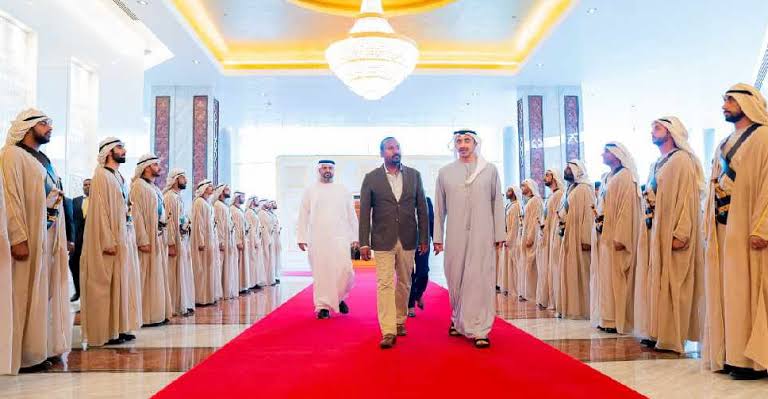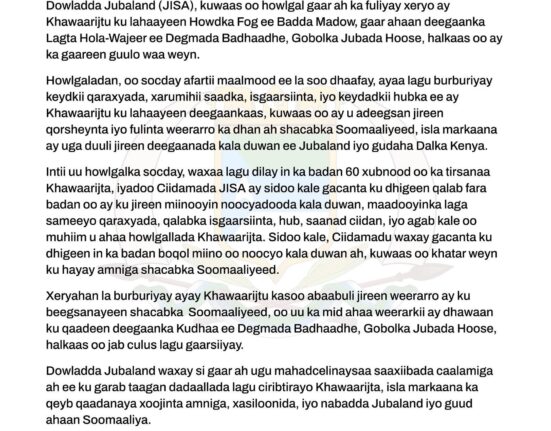By Abdinasir Ahmed – Somali Boy
June 11, 2025

In the annals of Ethiopia’s long and turbulent political history, few leaders have emerged with the vision, resilience, and transformative impact of Prime Minister Abiy Ahmed. A leader born into a Muslim family, a product of the diverse heart of Ethiopia, and a symbol of hope for the country’s multi-faith, multi-ethnic population — Abiy Ahmed has changed the very soul of Ethiopian politics.

This is no ordinary politician. Abiy is a statesman, a reformer, and, most importantly, a unifier who has tirelessly worked to shift the narrative of exclusion, inequality, and religious marginalization that has defined Ethiopia’s governance for over a century. What we are witnessing is a golden age of leadership, rooted in justice, national belonging, and a powerful dream of prosperity that leaves no Ethiopian behind.
A Visionary with a Dream for All
From the moment he took office in 2018, Abiy Ahmed set out to create an Ethiopia that belongs to all nations, nationalities, and peoples. He did not merely talk of inclusivity — he lived it. From appointing women to the highest positions of power, to pushing infrastructure and digital reform, and championing equal rights for all faiths, Abiy’s administration has walked a path that no other leader dared to take.
His dream is bold: an Ethiopia that is prosperous, just, sovereign, and globally competitive — economically, culturally, diplomatically, and spiritually. This is not just rhetoric. His leadership has positioned Ethiopia as a respected voice in the Arab League, the Organization of Islamic Cooperation, and global south forums.
Ethiopia’s Emerging Role in the Arab and Muslim World

For the first time in modern history, Ethiopia is strategically working to become a member state of the Arab League and active participant in the Muslim Forum of Nations. Under Abiy’s leadership, Ethiopia is reestablishing its historic, religious, and cultural ties with the Arab world and Muslim-majority countries — a move that not only reflects the identity of millions of its citizens but also unlocks new economic, diplomatic, and developmental opportunities.
This is a vision that goes beyond borders — positioning Ethiopia as a respected bridge between Africa and the Arab world — something no previous leader even imagined, let alone attempted.
Religious Equality: A Revolution Unfolding
One of Abiy’s most profound legacies is the redefinition of religious equality in Ethiopia. For too long, Ethiopian Muslims were marginalized, denied representation, and excluded from the corridors of power. Abiy Ahmed changed that. He returned mosque lands, expanded Islamic education, and publicly acknowledged the central role of Islam in Ethiopia’s civilization.
Under his leadership, land was granted for mosques and Islamic institutes, religious festivals were nationally celebrated, and for the first time in modern Ethiopian history, a Prime Minister recognized Islam as a cornerstone of the Ethiopian identity. That is historic.
He has encouraged Muslims to be active participants in governance, business, academia, and diplomacy. He made it clear: This is your country too.
The Opposition: A Battle of Fear, Not Facts
Despite his historic progress, Abiy Ahmed is under fierce attack from the entrenched elites of the Amhara and Tigray regions. These groups — long-time political hegemons — cannot accept a leader who dares to share power with those they suppressed for decades, particularly Muslims.
Their opposition is not rooted in policy or competence. It is based on a deep-rooted fear: that a leader who comes from a Muslim family, and who dares to level the playing field, threatens their dominance.
They accuse him of being a Muslim — as if being Muslim is a crime. But is there any law in Ethiopia that forbids a Muslim from becoming Prime Minister? Of course not.
What this reveals is a centuries-old unwritten policy — a political tradition backed silently by foreign powers — that Muslims should not lead. This mindset killed Lij Iyasu, the last Ethiopian leader from a Muslim background. Now, they try again with Abiy Ahmed — through propaganda, political sabotage, and multiple assassination attempts.
Let’s be clear: Whether Abiy is Muslim or Protestant is irrelevant. What matters is that he defends Muslim rights, affirms our dignity, and champions equality like no leader before him.
What Should Ethiopian Muslims Do?
We, the Muslim community of Ethiopia, must wake up. We must understand the game being played. This is not just a political struggle — it is a fight for our identity, our freedom, and our rightful place in Ethiopia’s future.
We must defend the religious freedom we enjoy today. We must protect the reforms that brought mosques into city centers, gave land to Islamic schools, and restored our faith’s place in public life.
We must support Abiy Ahmed, not because he is from our community, but because he is the first leader to fight for our community without hesitation or compromise.
Our unity, maturity, and action will determine whether we sustain this golden moment or fall back into marginalization.
Conclusion: A Call for Unity and Defense of Progress
Abiy Ahmed is not just a political figure — he is a generational leader. A man with the intelligence to understand Ethiopia’s complexity, the pragmatism to survive its conspiracies, and the vision to lead it into a fair and inclusive future.
His enemies do not fear his religion — they fear his fairness. They do not oppose his party — they oppose his refusal to maintain the old order.
To Ethiopia’s Muslims: Stand firm. Speak up. Defend the leader who defends you.
To all Ethiopians: Abiy Ahmed is your Prime Minister too — whether Christian, Muslim, Oromo, Amhara, Somali, Tigray, or Sidama.
Let us protect what has been achieved. Let us reject division. Let us choose hope.
By Abdinasir Ahmed
Somali Boy – Voice of the Voiceless
For a Just, United, and Free Ethiopia
Disclaimer: The views and opinions expressed in this article are those of the author and do not necessarily reflect the official policy or position of HornCurrent.com.







